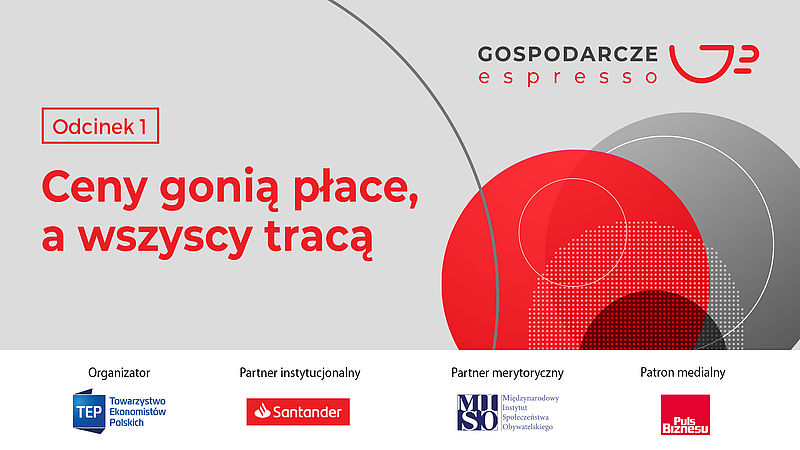Prices Chase Wages, and Everyone Loses - Economic Espresso
The attended speakers were: Prof. Elżbieta Adamowicz (Institute of Economic Development, Warsaw School of Economics, Society of Polish Economists), Paweł Borys (PFR – Polish Development Fund), Maciej Grabowski (Strategic Thought Center Foundation), Marek Rozkrut (EY Poland) and Maciej Reluga (Santander Bank Poland).
Economic Espresso is a project that provides a platform for a lively, substantive discussion and exchange of experiences and views on the current condition of the Polish economy and the most important socio-economic events.
In the first episode, experts discussed sensible economic policy-making, pandemic-induced changes in the economy, high inflation and a plan for possible halting price increases.
- The Institute for Economic Development of the Warsaw School of Economics is conducting a study on the economy. We already have results on what is happening in the economy in the fourth quarter. It should be said that the economy is definitely slowing down. This is happening both on a general level and in individual spheres of economic activity - Prof. Elzbieta Adamowich said.
- The year 2021 surprised me very positively, at least in terms of private investments. They were recovering nicely, actually grew relatively dynamically throughout the year. What dragged down our total investment dynamics was public investment. The year 2022 (subject to the release of EU funds) is a good opportunity, if we just continue to grow private investment at a similar pace to that of the first year of the pandemic. It seems to me that this is possible, as we are noticing a high degree of capacity utilization in the labor market and fairly low unemployment - Maciej Reluga said.
- Strong inflation increases, driven primarily by energy prices, have occurred in all European Union countries. Metal prices and disruptions in supply chains also play a role, although to a lesser extent than the rise in energy prices. Additionally, in our region, including Poland, a relatively large impact on inflation compared to Western European economies is due to rising domestic demand - Dr. Marek Rozkrut said.
- We can build resilience by taking care of the foundations of our economy. On the one hand, after the pandemic, we need to consolidate public finances, get out of debt, tighten the deficit. On the other hand, we should fuel economic growth with investment. It seems to me that this can actually happen. The labor market, the household sector, as well as the business sector are in good shape - Paweł Borys said.
The conversation was moderated by Łukasz Korycki, deputy editor-in-chief of Puls Biznesu.


